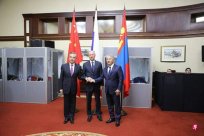A report issued by the International Energy Agency stated that by the end of 2023, the capacity of low carbon -made hydrogen electrolytes in China will reach half of global production capacity.
According to Agence France -Presse, the International Energy Agency issued a report on Friday (September 22) that the new projects slowed down due to inflation, but China is in a leading position in electrolytic tank deployment. By the end of 2023, by the end of 2023It will control half of the global hydrogen electrolyte production capacity.
Although it started late, the production capacity of China's electrolytic tank installation in recent years has increased significantly, and it is expected to reach 1.2 Giwat (1.2 billion watts), which accounts for half of the global production capacity; and the production capacity of China's electrolytes in 2020 accounted for only global10%of production capacity.
Electrolytic grooves are hydrogen and oxygen equipment used in industrial separation water molecules. It can use power obtained by renewable energy such as solar energy, wind energy or nuclear energy.With the development of green energy, electrolytic grooves are replacing traditional industrial hydrogen production methods.
The International Energy Agency said that as long as all the announced projects have been implemented, the output of low hydrocarbon in 2030 will reach 38 million tons.
But inflation has led to rising equipment costs. In the report, the International Energy Agency said that some projects have raised its initial cost by 50%.This makes the International Energy Agency worry that the speed of green hydrogen replacing traditional hydrogen in the world is too slow.
The International Energy Agency pointed out that less than 1%of global demand in low hydrogen hydrocarbons in 2022 means that the use of hydrogen caused by hydrogen is equivalent to 900 million tons of carbon dioxide.
The International Energy Agency said that the use of low hydrocarbons still has far from reaching the level of climate goals.The agency also called for strengthening international cooperation and avoiding market division.


